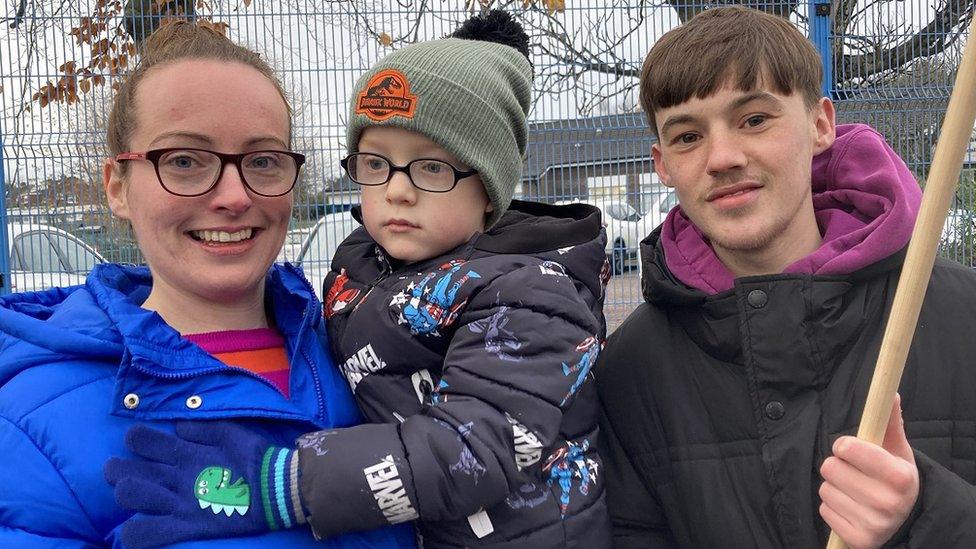Northern Ireland strikes: Unions asked for special schools exemption
- Published
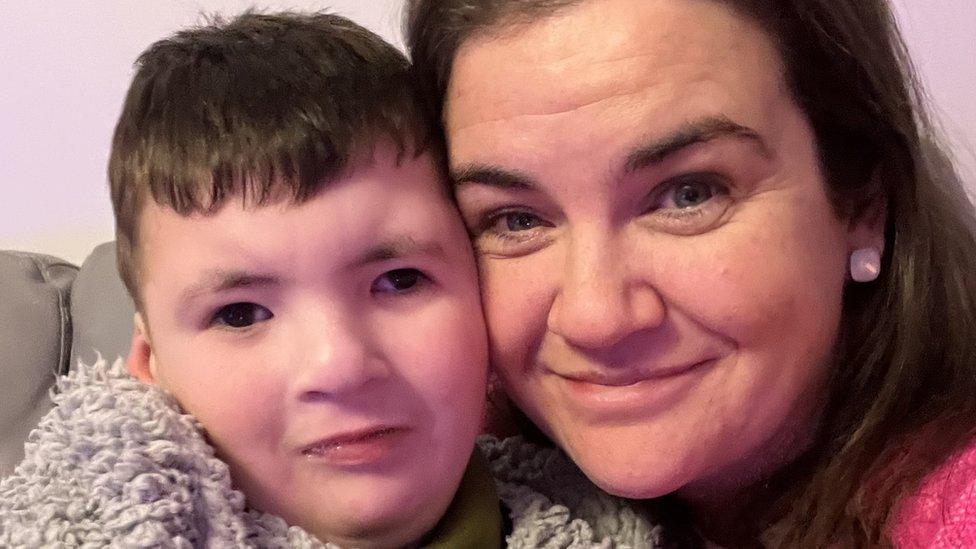
Ann-Marie O'Neill said it feels like her son Eoin is being "forgotten"
Trade unions have been asked to allow special school staff to come to work during upcoming strike action which will close some schools for eight days.
Support staff including bus drivers, canteen workers and classroom assistants will take part in the strikes over pay.
The Education Authority (EA) made the exemption plea and union Unite has agreed to meet the EA over the issue.
However, unions have turned down the request on previous strike days.
Parents have told BBC News NI about their serious concerns over school closures.
Ann Marie O'Neill, whose 10-year-old son Eoin has a rare genetic condition, said he is being forgotten.
Glenveagh School in Belfast, which Eoin attends, has said it will close on the eight strike days due to the "degree of staffing deficiency and associated risks".
Strikes: 'Protect vulnerable children from industrial action'
Ms O'Neill said the disruption will have a "massive impact" on Eoin, who is heavily reliant on routine.
"Once again it's the children with special needs who are disproportionately impacted," she said.
"The mainstream schools are, at most, impacted for a day but the children who are the most vulnerable are just not being seen and we feel like we're not being heard and that our children don't matter.
"If this was impacting mainstream schools people would be shouting from the rooftops and it wouldn't be allowed to happen."
Emma Morgan, from campaign group SEN Reform NI, said her she was aware of parents who "burst into tears" when they heard about the closures.
"People are trying to keep jobs, manage other caring responsibilities," she added.
"Many children with additional needs have significant behavioural problems as well so they can be taken out on the parents at home."
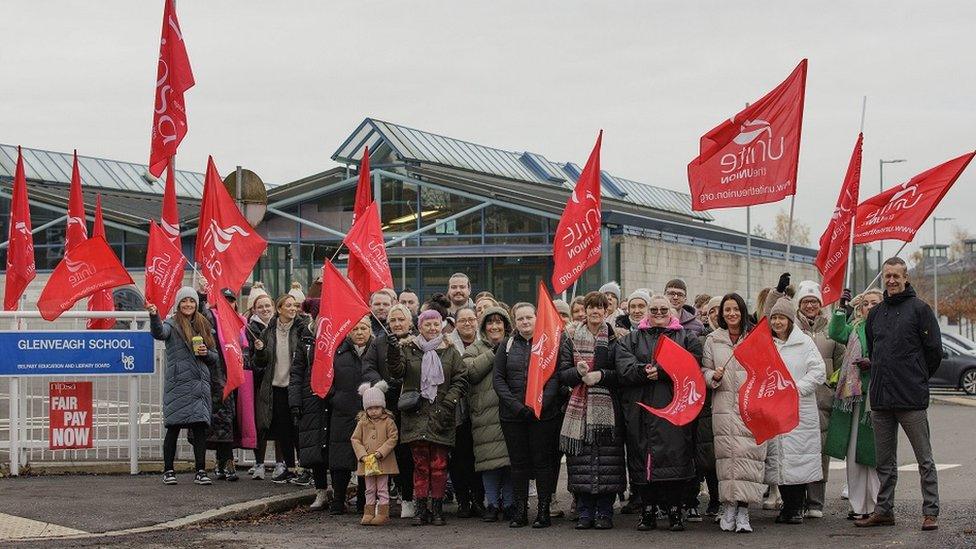
A picket line outside Glenveagh School in November 2023 when thousands of education support workers across Northern Ireland previously took strike action
What are the Northern Ireland strikes about?
Public sector workers in Northern Ireland in areas including health, education and the civil service have been holding a number of strikes over pay disputes.
Next Thursday, 18 January, tens of thousands are set to take part in a strike unions have billed as the biggest in Northern Ireland's history.
It has since been confirmed by Unite that members who work for the Education Authority as school support staff will be taking part in eight days of strike action on 17-19 January; 24-26 January; and 1-2 February.
Unite general secretary Sharon Graham said that "funding to deliver the pay and grading review is available but it is being withheld by the secretary of state for Northern Ireland".
"It is disgraceful that workers' pay is being used as a political bargaining tool," she said.
With special schools particularly reliant on support staff, some have said they will be forced to close during the strikes.
It has led to the EA asking the unions for exemptions for special school staff to come to work.
The authority has made the same request on previous strike days affecting special schools but had been turned down by the unions each time.
Unite the Union has said it will meet EA representatives to discuss the request for dispensation before making a decision.
Speaking on the BBC's Good Morning Ulster programme, Unite's Kieran Ellison said: "Obviously we are not people who have no heart.
"This is done out of necessity. Not a single member of Unite the Union has ever said: 'I want to disrupt these children's lives'. In fact, quite the opposite."
What are parents saying?
Ms O'Neill said the lack of routine caused by the strikes impacts Eoin's sleeping, in particular.
"He already needs 24/7 care so if he's not sleeping during the night then that has a real impact on him and of course on the whole family as well.
"Myself and my husband work full time, so what do you do with a child like Eoin for eight days?
"We can't replicate all of the things he gets at school and all of that input so it really becomes quite a strain on us trying to juggle everything."
Ms O'Neill added that while she supports everyone's right to fair pay and doesn't blame the school, someone "needs to be accountable for these decisions, or lack of decisions".
Ms Morgan, whose five-year-old son Tom attends a social communication unit at a County Down primary school, said it was "shocking that some of our most vulnerable children are going to be out of school for eight days in comparison to one day".

Emma Morgan said the disruption is "shocking"
She added: "It's a greater issue that our educators in Northern Ireland are not getting paid in parity with the rest of the UK.
"The educators we have in special education in Northern Ireland are unbelievable people - they're wonderful.
"Staff in special education and in schools in general in Northern Ireland need paid fairly."
Who can solve public sector pay?
Earlier this week, Prime Minister Rishi Sunak said public sector pay disputes in Northern Ireland could be resolved "rapidly" if the Stormont executive was restored.
A £3.3bn financial package has been tabled by the government, including almost £600m to solve the pay dispute, if the DUP ends its boycott and power-sharing government in Northern Ireland returns.
A Northern Ireland Office spokesperson said the secretary of state and the government had no authority to negotiate public sector pay in Northern Ireland.
"It is for the relevant Northern Ireland departments to negotiate pay policies," the spokesperson said.
"The secretary of state has expressed his disappointment that a new executive was not up and running to take the offer on the table and deliver it for the people of Northern Ireland before Christmas.
"It is now for the NI parties to come together, restore the Executive and begin to address the challenges facing the people of Northern Ireland, including public sector pay."
However, Unite said its members "are clear that our secretary of state continues to fail them badly".
The union added that it understood the EA cannot meaningfully progress the pay dispute "due to the funding required not being provided by the secretary of state".
In a statement, the Education Authority said: "The EA will work closely with all schools to implement where possible a range of contingency measures to minimise disruption for children and young people, as we very much recognise the impact that industrial action may have for our pupils, schools, and families.
"EA has asked for a derogation for special school staff as we fully understand that this impacts on the most vulnerable of our children and the EA is making every effort to minimise disruption and keep parents, children and young people informed."
Related topics
- Published11 January 2024
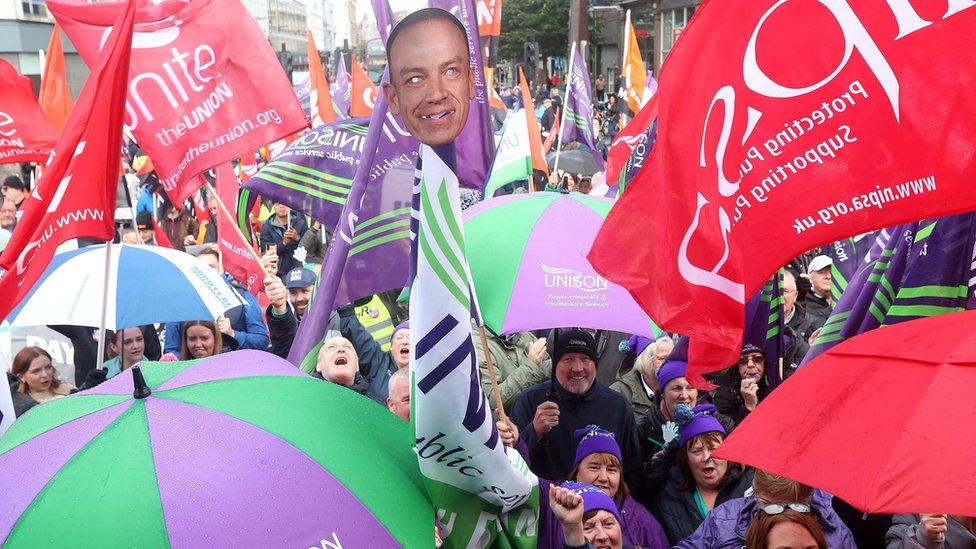
- Published10 January 2024
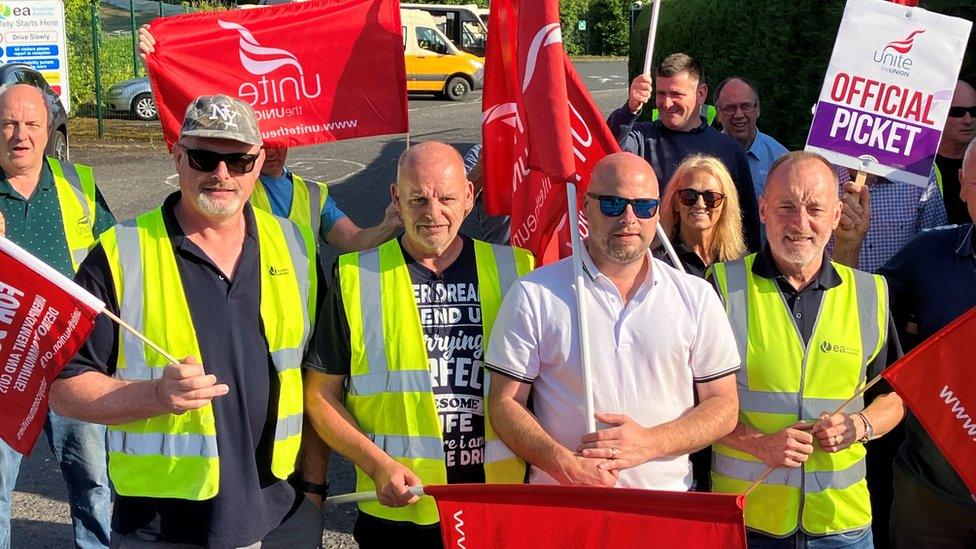
- Published16 November 2023
